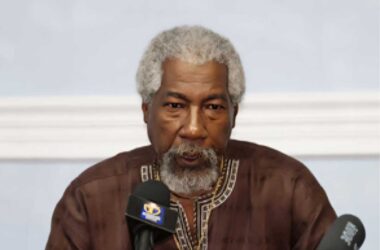
Love for guns and gangs has been a part of Caribbean culture from colonial times when the British West Indies saw ‘toy gun’ sales peak at Christmas and groups of students from neighboring schools developed rivalries over everything from games results, to crossing pathways considered school turf.
Back then, toy shops sold ‘Amos Guns’ made from tin that sparked an explosive-laden tape to look and sound like real bullets, as well as plastic ‘Water Guns’ to aim and squirt at friends and ‘Daisy Guns’ to hunt, aim at and shoot birds – in all three cases introducing a gun culture through toys.
And while students were attracted to turf wars according to schools and uniforms, the gang culture was unknowingly taking shape.
That was back in the 60s…
Fast-forward to 1972 and Jimmy Cliff’s hit movie ‘The Harder They Come’ (from his hit song by the same name) draws the support and admiration of Caribbean people at home and abroad, more as an appreciation of its representation of Caribbean performance ability than admiration of the gang culture behind the story.
Fifty years later, the gang culture is a real part of Caribbean life, but largely being treated as something new when all that’s new is the way it’s become engrained in every Caribbean state and territory, including the non-independent British, Dutch, French and American colonies in the lengthy chain of hundreds of islands and islets, as well as on the South American mainland.
Caribbean gang crime today ranges from the savagery of slayings and drive-by shootings to proliferation of guns for drugs across borders and continents, with US, British, French and Dutch navies often reporting huge findings of illegal shipments on vessels or dumped at sea involving Caribbean gangs and their South American counterparts.
The more sophisticated Caribbean gangs are also being accused of facilitating human trafficking from Cuba, Venezuela and Haiti through regional networks to the US through South America, including Guyana, while commercial sector shippers of humans also count on the organized gangs to transport and transfer Asian migrants through Caribbean routes.
Regional media houses pander to people’s fears and insecurities by fanning and feeding them for ratings, without concern about the long-term consequences of building societies scared (by the media also) into silence by violence.
Media houses across the region still lazily and insensitively seek-out comments from grieving parents and relatives within minutes or hours after a killing, only to ask “How do you feel?” and/or “Was he good or bad to you?”, rather than engage in investigative research to put the killings in a wider national context — and to include reports with suggestions for solutions, instead of watering sobs and grating broken hearts.
More people still die of non-violent causes, but it’s the killings and comparable ‘homicide rates’ that become the news focus, instead of also examining the causes of non-violent deaths, which leave victims’ families grieving no-less.
But here again, the focus is on the gunplay and the victims instead of community and the country, on cemeteries getting filled and not on the related community-reluctance crises facing governments to build new cemeteries.
We continue to highlight and discuss the number of dead daily, instead on the number of babies born, assessing the population-growth consequences and whether enough is being done today to secure tomorrows and a safer future for today’s newborns.
Gun crime also survives on the societal mistrust in the ability of national police forces to tackle today’s more-sophisticated crimes, including use of hi-tech and IT means to facilitate what used to be classified as ‘Blue Collar’ and ‘White Collar’ crimes.
Except when forced to by public concern, Governments don’t act in unison to upgrade the abilities of their national police forces to match the sophistry of the criminal networks, many of which grew out of historical ‘naughty neighborhoods’, but also now employ IT support in their qualitatively-upgraded criminal endeavors.
Caribbean Development Bank (CDB) President Dr Hyginus ‘Gene’ Leon in March advised the Regional Security System (RSS) to revisit their methods by adopting more “regional approaches” that are outside the proverbial box, but within the region’s reach.
Grenada’s Prime Minister Dickon Mitchell says governments can start by tightening gun laws at home and working harder together to effectively fight the continuing unbridled proliferation and circulation of mainly US-made illegal firearms across the wider Caribbean and South American region.
The continuing unbridled entry of arms Made in the USA, including through air and sea ports, require much-higher levels of cooperation — with the Caribbean — on the part of the US, UK, Canada, France, The Netherlands and others involved in similar but separate operations against smuggling and trafficking of guns, drugs and people.
One aspect of the gang warfare that pleases the police and government security apparatus is the acceleration of the process of attrition, but even here, the collateral cost in innocent or non-involved lives is always too much.
In the circumstances, while gangsters are bold enough in some instances to aggressively confront government ministers and make illegal firearms available or accessible to children or teens too young to be safe with loaded guns, governments are also coming to grips with and accepting the fact that in many cases, gang leaders and gangsters do have levels of covert protection and collusion with minority elements at different levels of police forces, who provide major support for their national and trans-border crimes.
Of course, all of the above is known but only spoken of in whispers as fear of reprisals continues to haunt and dissuade those who know from cooperating with investigators, many also pointing to unavailability of appropriate rewards, or guaranteed witness protection.
Meanwhile, 50 years after Jimmy Cliff’s classic thriller, he’s still also singing today for world peace and unity, while the gangsters miss the main message from his song and movie: “The harder they come, the harder they fall, one and all!’





